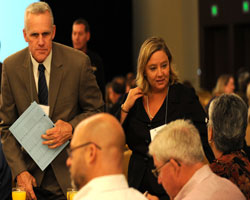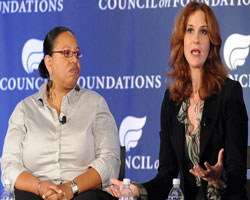Rehabilitating the Classroom Plenary Highlights
American Classrooms Under Construction
 There was an almost palpable energy hovering over the ballroom as attendees took their seats for the opening plenary session, “Rehabilitating the Classroom: A Candid Discussion of Education Reform,” at the fall conference. Community foundation professionals tend to be enthusiastic individually so their shared passion created an amazing synergy that kicked off the next three days of programming.
There was an almost palpable energy hovering over the ballroom as attendees took their seats for the opening plenary session, “Rehabilitating the Classroom: A Candid Discussion of Education Reform,” at the fall conference. Community foundation professionals tend to be enthusiastic individually so their shared passion created an amazing synergy that kicked off the next three days of programming. According to the panel—a parent, a principal, and a teacher—a gauntlet of challenges lie ahead. These challenges, including inadequate funding, restrictive collective bargaining agreements, and competition from charter schools, are making the mission to give all children better access to quality education more difficult, but not impossible.
“We must transform our schools. Unfortunately, much of what we think about school improvement misses the mark,” said moderator Terry Mazany, president and CEO of The Chicago Community Trust. “It’s as if General Motors thought the only important thing about building automobiles was that they had to have wheels.”
From a community foundation perspective, we all know that as people fall into poverty, the safety nets to catch them no longer exist. And my question is: Did they fall or were they pushed?
~Terry Mazany
 The panel and Mazany engaged in a candid discussion about issues that, from their perspectives, are keeping American students in arrested academic development. The conversation was kicked off by Jacqueline Edelberg, a mother who worked to reform her children’s neighborhood school in an amazingly short time and chronicled the movement to change the dynamic of the institution.
The panel and Mazany engaged in a candid discussion about issues that, from their perspectives, are keeping American students in arrested academic development. The conversation was kicked off by Jacqueline Edelberg, a mother who worked to reform her children’s neighborhood school in an amazingly short time and chronicled the movement to change the dynamic of the institution. “I can assure you I’m not Joan of Arc,” she said. "There are women and men like me who sit around every sandbox in this country and could very easily be motivated and galvanized to fix every neighborhood school, if only they knew it was possible.”
LaRavian Battle, a math instructor and education crusader based in Oakland, Calif., pointed out that her students’ biggest barrier to academic excellence is worrying about gangs and personal safety. Alicia Romero, principal at Oakland High School, roused the crowd with her personal mantra: “If it’s good for the kids, I’m doing it,” noting that she has support from her superintendent to be creative and diligent about keeping students in the classroom, even if that means picking them up when they don’t have bus fare to get to school.
Referencing a recent headline declaring that 46 million Americans are living under the dire straits of poverty, Mazany pointed to education as an integral component of not only a reasonably comfortable existence in the years to come, but the foundation of basic survival, particularly in urban areas. He added: “From a community foundation perspective, we all know that as people fall into poverty, the safety nets to catch them no longer exist. And my question is: Did they fall or were they pushed?”


